论英语中的性别歧视分析
试述英语语言中的性别歧视现象
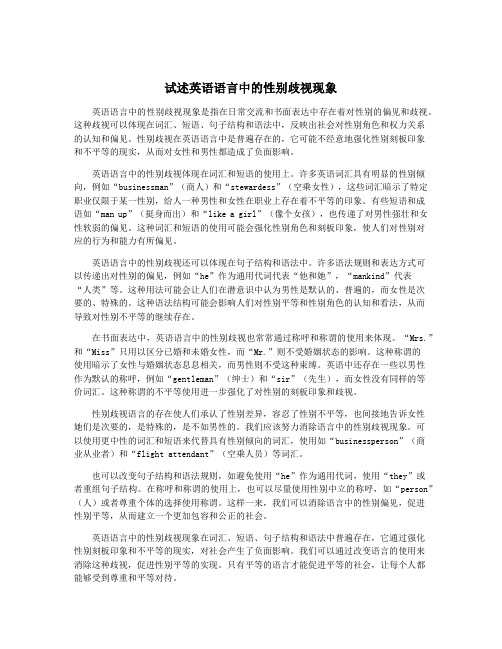
试述英语语言中的性别歧视现象英语语言中的性别歧视现象是指在日常交流和书面表达中存在着对性别的偏见和歧视。
这种歧视可以体现在词汇、短语、句子结构和语法中,反映出社会对性别角色和权力关系的认知和偏见。
性别歧视在英语语言中是普遍存在的,它可能不经意地强化性别刻板印象和不平等的现实,从而对女性和男性都造成了负面影响。
英语语言中的性别歧视体现在词汇和短语的使用上。
许多英语词汇具有明显的性别倾向,例如“businessman”(商人)和“stewardess”(空乘女性),这些词汇暗示了特定职业仅限于某一性别,给人一种男性和女性在职业上存在着不平等的印象。
有些短语和成语如“man up”(挺身而出)和“like a girl”(像个女孩),也传递了对男性强壮和女性软弱的偏见。
这种词汇和短语的使用可能会强化性别角色和刻板印象,使人们对性别对应的行为和能力有所偏见。
英语语言中的性别歧视还可以体现在句子结构和语法中。
许多语法规则和表达方式可以传递出对性别的偏见,例如“he”作为通用代词代表“他和她”,“mankind”代表“人类”等。
这种用法可能会让人们在潜意识中认为男性是默认的、普遍的,而女性是次要的、特殊的。
这种语法结构可能会影响人们对性别平等和性别角色的认知和看法,从而导致对性别不平等的继续存在。
在书面表达中,英语语言中的性别歧视也常常通过称呼和称谓的使用来体现。
“Mrs.”和“Miss”只用以区分已婚和未婚女性,而“Mr.”则不受婚姻状态的影响。
这种称谓的使用暗示了女性与婚姻状态息息相关,而男性则不受这种束缚。
英语中还存在一些以男性作为默认的称呼,例如“gentleman”(绅士)和“sir”(先生),而女性没有同样的等价词汇。
这种称谓的不平等使用进一步强化了对性别的刻板印象和歧视。
性别歧视语言的存在使人们承认了性别差异,容忍了性别不平等,也间接地告诉女性她们是次要的,是特殊的,是不如男性的。
我们应该努力消除语言中的性别歧视现象。
试述英语语言中的性别歧视现象

试述英语语言中的性别歧视现象1. 引言1.1 性别歧视的定义Overall, gender discrimination in English language is a pervasive issue that has far-reaching implications for how individuals are perceived and treated based on their gender. It is important to recognize these biases and work towards creating a more inclusive and equitable language environment that respects and values individuals of all genders.1.2 英语语言中的性别歧视One prominent aspect of gender discrimination in language is the phenomenon of male dominance or male-centric language. This is evident in the prevalence of masculine terms being used as the default or generic form, while feminine equivalents are often added as an afterthought or considered secondary. For example, terms like "manpower" or "mankind" are frequently used to refer to all individuals, regardless of gender, thereby marginalizing women and reinforcing gender stereotypes.2. 正文2.1 语言中的男性优先现象Language reflects and influences societal beliefs and norms, including those related to gender. In the English language, there is a pervasive male-centric bias known as the "male as norm" phenomenon. This phenomenon positions men as the default or standard, while women are seen as the deviation from this norm.2.2 语言中的女性贬低现象语言中的女性贬低现象是指在英语语言中存在一些词语或短语,它们贬低女性或将女性视为弱势群体。
英语语言性别歧视现象及其文化内涵

英语语言性别歧视现象及其文化内涵性别歧视是指一种基于性别的不公平待遇或偏见,这种现象在世界各地都存在,也在英语语言中有所体现。
英语语言中的性别歧视主要体现在以下几个方面:1. 代词使用:在英语中,有一些代词是具有性别的,如he(他)和she(她),这种用法暗示了男性在某些场合或属性上的优越性,而女性则处于从属地位。
这种语言上的区分反映了社会中对男性和女性角色的认知和期待。
3. 夸张的男性标准:在英语语言中,一些词汇和短语经常用来描述男性特质,如strong(强壮的)、brave(勇敢的)、tough(坚强的)等。
这些词汇传递出一种对于男性刻板形象的期待,同时也暗示了女性在这些特质上的不足。
这些性别歧视现象的存在反映了英语语言所承载的文化内涵。
在英语语言中,男性通常被认为有更高的社会地位和更多的权力,而女性则处于从属地位。
这种文化内涵凸显出男性主导和女性从属的性别角色定位,使得性别歧视现象在英语语言中得以存在和流传。
越来越多的人意识到性别歧视的存在对社会造成的负面影响,并且开始努力消除这种现象。
在英语语言中,也出现了一些反性别歧视的倡议和变革。
有些人开始使用gender-neutral(中性)代词,如they(他们)替代he或she,以求达到性别中立的表达。
也有人提倡使用gender-inclusive(包容性别)的职位称谓,如actor代替actor和actress,以避免性别差异。
英语语言中存在的性别歧视现象反映了该语言所蕴含的文化内涵,同时也需要我们的关注和反思。
通过倡导性别平等和消除歧视,我们可以推动社会的进步和公正,使每个人都能够受到平等对待和尊重。
论英语中的性别歧视及其发展变化-精品文档
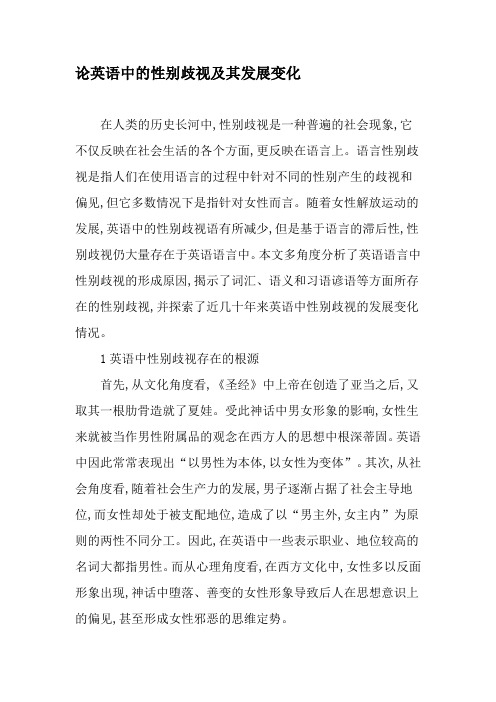
论英语中的性别歧视及其发展变化在人类的历史长河中,性别歧视是一种普遍的社会现象,它不仅反映在社会生活的各个方面,更反映在语言上。
语言性别歧视是指人们在使用语言的过程中针对不同的性别产生的歧视和偏见,但它多数情况下是指针对女性而言。
随着女性解放运动的发展,英语中的性别歧视语有所减少,但是基于语言的滞后性,性别歧视仍大量存在于英语语言中。
本文多角度分析了英语语言中性别歧视的形成原因,揭示了词汇、语义和习语谚语等方面所存在的性别歧视,并探索了近几十年来英语中性别歧视的发展变化情况。
1英语中性别歧视存在的根源首先,从文化角度看,《圣经》中上帝在创造了亚当之后,又取其一根肋骨造就了夏娃。
受此神话中男女形象的影响,女性生来就被当作男性附属品的观念在西方人的思想中根深蒂固。
英语中因此常常表现出“以男性为本体,以女性为变体”。
其次,从社会角度看,随着社会生产力的发展,男子逐渐占据了社会主导地位,而女性却处于被支配地位,造成了以“男主外,女主内”为原则的两性不同分工。
因此,在英语中一些表示职业、地位较高的名词大都指男性。
而从心理角度看,在西方文化中,女性多以反面形象出现,神话中堕落、善变的女性形象导致后人在思想意识上的偏见,甚至形成女性邪恶的思维定势。
2性别歧视在英语中的表现2.1 从词形的标记角度看性别歧视英语词汇往往以男性为中心,表示男性的词汇一般是“无标记的”,可表示男女两性。
但是,女性的词汇通常是有标记的,只表示女性或女性的某一特征。
(1)基于男女不同的社会分工影响,英语中一些表示职业、地位较高的名词如mayor,doctor,president,governor等,人们在使用这些词的时候,大多数场合指的是男性,若要表明是女性,往往会在词前加上female/woman/lady标记出来。
(2)许多女性名词通常是在男性词汇后加上后缀,如:waiter / waitress,comedienne/ comedian,salesman/saleswoman等。
试述英语语言中的性别歧视现象
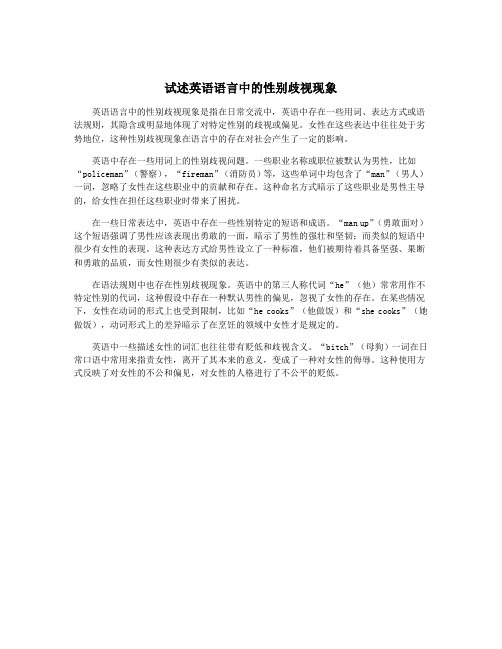
试述英语语言中的性别歧视现象
英语语言中的性别歧视现象是指在日常交流中,英语中存在一些用词、表达方式或语法规则,其隐含或明显地体现了对特定性别的歧视或偏见。
女性在这些表达中往往处于劣势地位,这种性别歧视现象在语言中的存在对社会产生了一定的影响。
英语中存在一些用词上的性别歧视问题。
一些职业名称或职位被默认为男性,比如“policeman”(警察),“fireman”(消防员)等,这些单词中均包含了“man”(男人)一词,忽略了女性在这些职业中的贡献和存在。
这种命名方式暗示了这些职业是男性主导的,给女性在担任这些职业时带来了困扰。
在一些日常表达中,英语中存在一些性别特定的短语和成语。
“man up”(勇敢面对)这个短语强调了男性应该表现出勇敢的一面,暗示了男性的强壮和坚韧;而类似的短语中很少有女性的表现。
这种表达方式给男性设立了一种标准,他们被期待着具备坚强、果断和勇敢的品质,而女性则很少有类似的表达。
在语法规则中也存在性别歧视现象。
英语中的第三人称代词“he”(他)常常用作不特定性别的代词,这种假设中存在一种默认男性的偏见,忽视了女性的存在。
在某些情况下,女性在动词的形式上也受到限制,比如“he cooks”(他做饭)和“she cooks”(她做饭),动词形式上的差异暗示了在烹饪的领域中女性才是规定的。
英语中一些描述女性的词汇也往往带有贬低和歧视含义。
“bitch”(母狗)一词在日常口语中常用来指责女性,离开了其本来的意义,变成了一种对女性的侮辱。
这种使用方式反映了对女性的不公和偏见,对女性的人格进行了不公平的贬低。
试述英语语言中的性别歧视现象

试述英语语言中的性别歧视现象
英语作为世界上最流行的语言之一,也存在着性别歧视现象。
这种歧视在英语中表现
出来的形式多种多样,涉及到语言的用法、发音、文化传统等方面。
首先,英语中的性别歧视表现在语言用法上。
例如,男性职业往往被用于普通的代词
和名词,而女性职业则通常需要添加一个附加词来强调性别。
例如,“男”医生通常被简
称为“医生”,而“女”医生则几乎总是要被称为“女医生”,这种方式给人造成了一种
男性地位高于女性的感觉。
其次,在英语的发音上,也存在性别歧视现象。
例如,由于英语中很多单词和短语含
有“he”或“she”的音素,因此听到相应的词汇时,人们往往会自然而然地与相应的性
别联系起来,并且这种联系体现在听到这些词汇的发音上。
这种现象可能会使得某些女性
在英语语言环境中感到不被尊重或排挤。
此外,英语中的文化传统也会导致性别歧视的现象。
例如,在英语文学、广告、媒体
等方面,男性往往被描绘成活跃、自信、强壮、有责任心的形象,而女性则被描绘为柔弱、依赖、感性和家庭主妇的形象。
这种文化传播对于英语语言中产生性别差异和歧视问题起
到了很大的影响。
总的来说,在英语中存在着性别歧视现象,而这种现象并不能轻易地被消除。
我们需
要进行更深入的研究和教育,以让人们认识到性别歧视的重要性,并努力通过教育和文化
的手段来消除这种歧视。
只有在这样的努力下,英语这样一种世界性的语言才会逐渐拥有
更加平等和包容的语言环境。
试述英语语言中的性别歧视现象
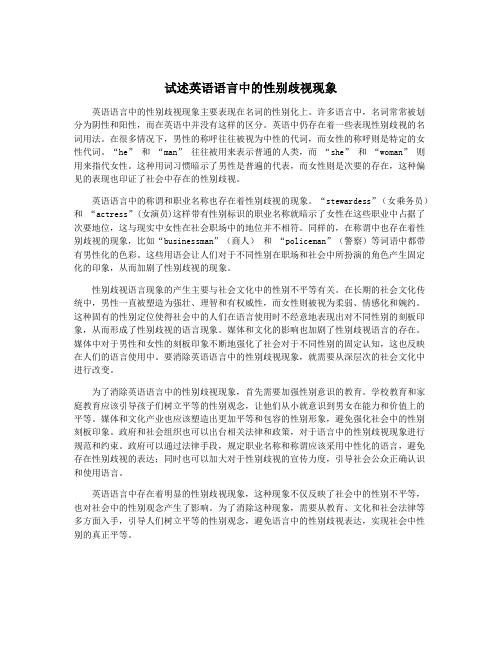
试述英语语言中的性别歧视现象英语语言中的性别歧视现象主要表现在名词的性别化上。
许多语言中,名词常常被划分为阴性和阳性,而在英语中并没有这样的区分。
英语中仍存在着一些表现性别歧视的名词用法。
在很多情况下,男性的称呼往往被视为中性的代词,而女性的称呼则是特定的女性代词。
“he” 和“man” 往往被用来表示普通的人类,而“she” 和“woman” 则用来指代女性。
这种用词习惯暗示了男性是普遍的代表,而女性则是次要的存在,这种偏见的表现也印证了社会中存在的性别歧视。
英语语言中的称谓和职业名称也存在着性别歧视的现象。
“stewardess”(女乘务员)和“actress”(女演员)这样带有性别标识的职业名称就暗示了女性在这些职业中占据了次要地位,这与现实中女性在社会职场中的地位并不相符。
同样的,在称谓中也存在着性别歧视的现象,比如“businessman”(商人)和“policeman”(警察)等词语中都带有男性化的色彩。
这些用语会让人们对于不同性别在职场和社会中所扮演的角色产生固定化的印象,从而加剧了性别歧视的现象。
性别歧视语言现象的产生主要与社会文化中的性别不平等有关。
在长期的社会文化传统中,男性一直被塑造为强壮、理智和有权威性,而女性则被视为柔弱、情感化和婉约。
这种固有的性别定位使得社会中的人们在语言使用时不经意地表现出对不同性别的刻板印象,从而形成了性别歧视的语言现象。
媒体和文化的影响也加剧了性别歧视语言的存在。
媒体中对于男性和女性的刻板印象不断地强化了社会对于不同性别的固定认知,这也反映在人们的语言使用中。
要消除英语语言中的性别歧视现象,就需要从深层次的社会文化中进行改变。
为了消除英语语言中的性别歧视现象,首先需要加强性别意识的教育。
学校教育和家庭教育应该引导孩子们树立平等的性别观念,让他们从小就意识到男女在能力和价值上的平等。
媒体和文化产业也应该塑造出更加平等和包容的性别形象,避免强化社会中的性别刻板印象。
浅谈英语语言中性别歧视
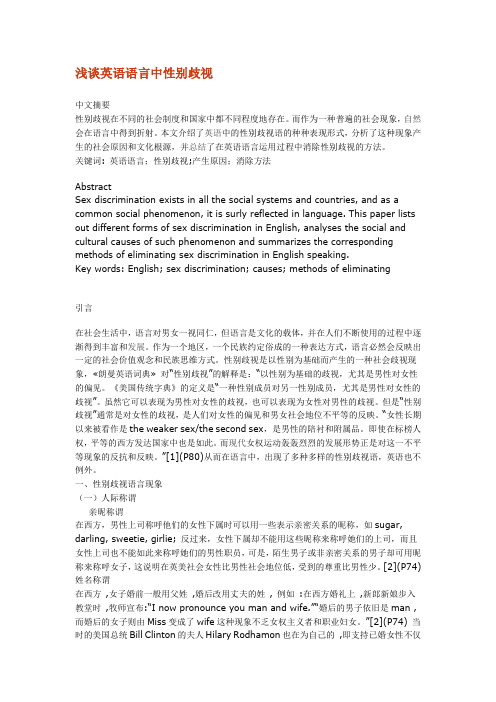
浅谈英语语言中性别歧视中文摘要性别歧视在不同的社会制度和国家中都不同程度地存在。
而作为一种普遍的社会现象,自然会在语言中得到折射。
本文介绍了英语中的性别歧视语的种种表现形式,分析了这种现象产生的社会原因和文化根源,并总结了在英语语言运用过程中消除性别歧视的方法。
关键词: 英语语言;性别歧视;产生原因;消除方法AbstractSex discrimination exists in all the social systems and countries, and as a common social phenomenon, it is surly reflected in language. This paper lists out different forms of sex discrimination in English, analyses the social and cultural causes of such phenomenon and summarizes the corresponding methods of eliminating sex discrimination in English speaking.Key words: English; sex discrimination; causes; methods of eliminating引言在社会生活中,语言对男女一视同仁,但语言是文化的载体,并在人们不断使用的过程中逐渐得到丰富和发展。
作为一个地区,一个民族约定俗成的一种表达方式,语言必然会反映出一定的社会价值观念和民族思维方式。
性别歧视是以性别为基础而产生的一种社会歧视现象,«朗曼英语词典»对“性别歧视”的解释是:“以性别为基础的歧视,尤其是男性对女性的偏见。
《美国传统字典》的定义是“一种性别成员对另一性别成员,尤其是男性对女性的歧视”。
试述英语语言中的性别歧视现象
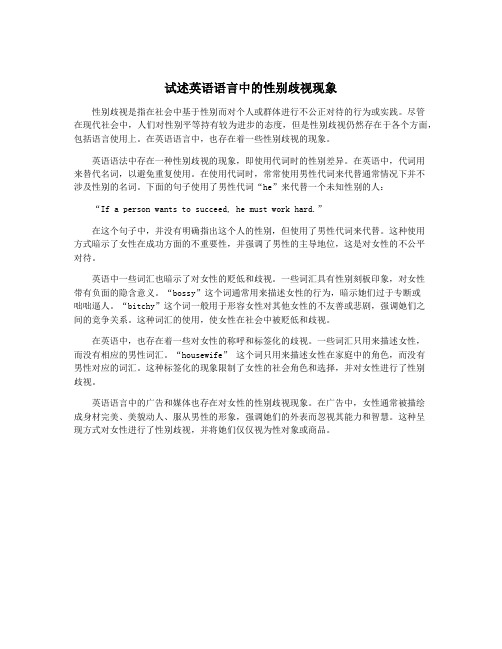
试述英语语言中的性别歧视现象性别歧视是指在社会中基于性别而对个人或群体进行不公正对待的行为或实践。
尽管在现代社会中,人们对性别平等持有较为进步的态度,但是性别歧视仍然存在于各个方面,包括语言使用上。
在英语语言中,也存在着一些性别歧视的现象。
英语语法中存在一种性别歧视的现象,即使用代词时的性别差异。
在英语中,代词用来替代名词,以避免重复使用。
在使用代词时,常常使用男性代词来代替通常情况下并不涉及性别的名词。
下面的句子使用了男性代词“he”来代替一个未知性别的人:“If a person wants to succeed, he must work hard.”在这个句子中,并没有明确指出这个人的性别,但使用了男性代词来代替。
这种使用方式暗示了女性在成功方面的不重要性,并强调了男性的主导地位,这是对女性的不公平对待。
英语中一些词汇也暗示了对女性的贬低和歧视。
一些词汇具有性别刻板印象,对女性带有负面的隐含意义。
“bossy”这个词通常用来描述女性的行为,暗示她们过于专断或咄咄逼人。
“bitchy”这个词一般用于形容女性对其他女性的不友善或悲剧,强调她们之间的竞争关系。
这种词汇的使用,使女性在社会中被贬低和歧视。
在英语中,也存在着一些对女性的称呼和标签化的歧视。
一些词汇只用来描述女性,而没有相应的男性词汇。
“housewife” 这个词只用来描述女性在家庭中的角色,而没有男性对应的词汇。
这种标签化的现象限制了女性的社会角色和选择,并对女性进行了性别歧视。
英语语言中的广告和媒体也存在对女性的性别歧视现象。
在广告中,女性通常被描绘成身材完美、美貌动人、服从男性的形象,强调她们的外表而忽视其能力和智慧。
这种呈现方式对女性进行了性别歧视,并将她们仅仅视为性对象或商品。
试述英语语言中的性别歧视现象
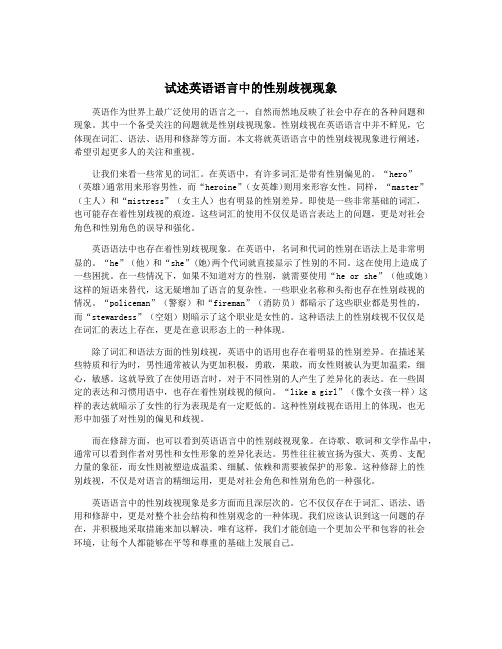
试述英语语言中的性别歧视现象英语作为世界上最广泛使用的语言之一,自然而然地反映了社会中存在的各种问题和现象。
其中一个备受关注的问题就是性别歧视现象。
性别歧视在英语语言中并不鲜见,它体现在词汇、语法、语用和修辞等方面。
本文将就英语语言中的性别歧视现象进行阐述,希望引起更多人的关注和重视。
让我们来看一些常见的词汇。
在英语中,有许多词汇是带有性别偏见的。
“hero”(英雄)通常用来形容男性,而“heroine”(女英雄)则用来形容女性。
同样,“master”(主人)和“mistress”(女主人)也有明显的性别差异。
即使是一些非常基础的词汇,也可能存在着性别歧视的痕迹。
这些词汇的使用不仅仅是语言表达上的问题,更是对社会角色和性别角色的误导和强化。
英语语法中也存在着性别歧视现象。
在英语中,名词和代词的性别在语法上是非常明显的。
“he”(他)和“she”(她)两个代词就直接显示了性别的不同。
这在使用上造成了一些困扰。
在一些情况下,如果不知道对方的性别,就需要使用“he or she”(他或她)这样的短语来替代,这无疑增加了语言的复杂性。
一些职业名称和头衔也存在性别歧视的情况。
“policeman”(警察)和“fireman”(消防员)都暗示了这些职业都是男性的,而“stewardess”(空姐)则暗示了这个职业是女性的。
这种语法上的性别歧视不仅仅是在词汇的表达上存在,更是在意识形态上的一种体现。
除了词汇和语法方面的性别歧视,英语中的语用也存在着明显的性别差异。
在描述某些特质和行为时,男性通常被认为更加积极,勇敢,果敢,而女性则被认为更加温柔,细心,敏感。
这就导致了在使用语言时,对于不同性别的人产生了差异化的表达。
在一些固定的表达和习惯用语中,也存在着性别歧视的倾向。
“like a girl”(像个女孩一样)这样的表达就暗示了女性的行为表现是有一定贬低的。
这种性别歧视在语用上的体现,也无形中加强了对性别的偏见和歧视。
试述英语语言中的性别歧视现象

试述英语语言中的性别歧视现象
英语语言中存在着性别歧视现象,表现在词汇、语法和表达方式等多个方面。
性别歧视也体现在英语语法中。
在第三人称单数代词中,he(他)常常被用作通用的
代词,即使指代的是男女都有的事物。
这使得女性在表达中更容易被忽视或缺席,反映了
对于男性的优先性和女性的较低地位。
类似地,许多动词和形容词都有男性和女性的形式,如manly(男性特征的)和womanly(女性特征的)。
这种语言上的划分也给人们灌输了一种对于“男性气质”的推崇,而对于“女性气质”的贬低。
英语中一些习语和成语也充斥着性别歧视。
“throw like a girl”(像女孩子扔东西)这种说法暗示女性体力较弱,低估了女性的潜力。
再如,“boys will be boys”(男孩就是男孩)这句成语暗指男性有些冲动、粗鲁的行为是可以被接受的,而女性则被要求更为
收敛和规矩。
这些成语和习语都在潜移默化中强化了性别刻板印象,对于男女的期待和评
价有着明显的偏见。
英语语言中存在着性别歧视现象,这体现在词汇、语法和表达方式等多个方面。
这些
偏见和歧视对于社会的性别平等产生了负面影响,需要我们关注和反思,努力消除性别歧视,实现性别平等。
英语语言性别歧视现象及其文化内涵

英语语言性别歧视现象及其文化内涵引言:语言是人类沟通的重要方式,它不仅仅是一种工具,更是人们思维、认知和文化的重要组成部分。
在语言的使用中存在着一些性别偏见和歧视观念,即人们在语言表达中对男性和女性的不公平对待。
这种性别歧视现象存在于许多语言中,包括英语。
本文将就英语语言中的性别歧视现象展开讨论,并探讨其背后的文化内涵。
一、英语语言中的性别歧视现象1. 使用委婉语言:英语中存在一些通过使用委婉语言来描述女性的习惯,这表现出一种道德或文化的偏见。
男性通常被称为“先生”(mister),而女性通常被称为“夫人”(madam)或“小姐”(miss)。
这种称谓的使用可能暗示女性的婚姻状况或者对她们的不同程度的尊重。
3. 谓词和形容词的使用:在英语中,谓词和形容词的使用也存在一些性别歧视。
通常认为,“男性”或“男人”是默认的普遍类别,而女性只是一个特殊的类别。
“他是医生”(he is a doctor)和“她是女医生”(she is a female doctor)之间的语言表达差异就显示了男性职业的普遍化和女性职业的特殊性。
二、英语语言性别歧视现象的文化内涵1. 社会角色分工和性别身份认同:英语语言的性别歧视现象反映了社会角色分工和性别身份认同的文化观念。
在许多文化中,男性被赋予了更多的权力和特权,被视为更加独立和有决策权的角色,而女性则更多地被赋予传统的照顾和家庭角色。
这种文化观念在语言中得到了体现,造成了对女性的歧视。
2. 男性为中心的性别意识形态:英语语言中的性别歧视现象还归因于男性为中心的性别意识形态。
这种意识形态认为男性在社会、政治和经济层面上具有更高的地位和权力,而女性则处于被支配和被动的地位。
男性的词汇和语法更容易成为普遍及中性词汇和语法。
3. 文化传统和历史背景:英语语言的性别歧视也与文化传统和历史背景有关。
在过去的几个世纪中,男性在社会生活中扮演着重要角色,而女性则被限制在家庭和私人生活中。
试述英语语言中的性别歧视现象

试述英语语言中的性别歧视现象1. 引言1.1 性别歧视的定义性别歧视是指基于性别或性别认同而产生的不公平对待或偏见。
这种不平等对待通常是由社会、文化或制度性因素造成的,导致对特定性别的人或群体进行歧视、排斥或限制他们的权利和机会。
性别歧视不仅限制了个人的发展和自由,也损害了整个社会的平等和公正。
在英语语言中,性别歧视也是普遍存在的现象。
这种现象体现在英语词汇、语法结构和语言习惯中。
一些特定的职业名称在英语中被默认为男性或女性,导致了对不同性别从事特定职业的偏见。
一些动词和形容词也存在着明显的性别偏见,如将男性与积极、有力或有能力联系在一起,而将女性与消极、软弱或无能联系在一起。
性别歧视在英语语言中的存在不仅影响了个体的自我认同和社会地位,也对整个社会的性别平等和公正构成了挑战。
我们需要更加关注和认识英语语言中的性别歧视问题,并采取积极的措施来消除这种现象,促进性别平等和社会公正。
1.2 英语语言中的性别歧视Gender discrimination in the English language is a pervasive issue that reflects and perpetuates societal gender biases. From the way we address individuals to the words we use to describegender roles, language plays a powerful role in reinforcing stereotypes and inequalities between men and women.2. 正文2.1 语言中的性别偏见语言中的性别偏见是指对不同性别的人在语言使用中存在偏向或偏见。
这种偏见可能体现在词汇选择、句法结构、语气和声调等方面。
在英语语言中,常见的性别偏见表现包括对男性视为默认或普遍代表,而女性则被视为特例或次要代表。
试述英语语言中的性别歧视现象

试述英语语言中的性别歧视现象英语是全球通用的语言之一,然而在英语语言中,性别歧视现象依然存在。
性别歧视是指基于性别对个体或群体进行不公平对待或给予特别优待的现象。
性别歧视在语言中表现为对男性和女性采用不同的称呼、用词和语法结构等方面,反映了社会对性别角色的刻板印象和偏见。
本文将试述英语语言中的性别歧视现象,并探讨如何消除这些不平等对待。
在英语语言中,性别歧视表现为对男女性别采取不同的称呼。
通常情况下,男性的称呼更多样化,如“sir”, “mister”, “gentleman”, 而女性的称呼只有“miss”或“mrs”,没有相应的称呼像男性一样多元。
这种情况反映了对男性称呼的尊重和尊重,而对女性称呼的简化和单一化,这可能会在潜移默化中影响对男女性别的认知和对待。
性别歧视还在英语语言中体现为用词的不平等对待。
比如“master”一词用于男性称呼,而“mistress”则被用于女性称呼,这体现了对男女性别的不平等对待。
同样,英语中有一些词语在男女性别中有不同的含义,如“bossy”一词常用来形容女性,而“assertive”则用于男性,这种双重标准也反映了对男女性别的不公平对待。
在英语语言的语法结构中也存在性别歧视现象。
在一些情况下,英语语法结构中的代词和形容词会根据性别的不同而有所变化。
比如“he”和“she”、“his”和“hers”,“man” 和“woman”等,这些词汇的不同变形也反映了对男女性别的不平等对待。
性别歧视在英语语言中的存在,不仅仅是对具体的语言表达形式的偏见,更是对于整个社会对于男女角色和期望的一种延续。
这种对于性别的不平等对待,不仅仅在语言中存在,在社会的方方面面都有所体现,而语言作为社会交流的一种方式,更是将这种歧视延续和传递的一种方式。
为了消除英语语言中的性别歧视现象,我们需要从多个方面着手。
教育机构应该在教学中注重性别平等教育,教导学生尊重性别差异,消除性别歧视的观念。
试述英语语言中的性别歧视现象

试述英语语言中的性别歧视现象在英语语言中存在着一些性别歧视的现象,这种歧视往往体现在对男女性别的称呼、表达方式、词汇选择等方面。
虽然在现代社会中已经有了很多对性别歧视的反对和改变,但是在语言中的性别歧视现象依然存在,需要引起我们的重视和关注。
英语语言中存在着一些针对女性的歧视称呼。
在很多情况下,人们会用一些带有贬义的词汇来形容女性,比如"bitch"、"slut"、"whore"等词汇。
这些词汇不仅在口头语言中被使用,而且在文学作品、音乐歌曲等媒体中也能听到,这种现象就是对女性的一种侮辱和歧视。
即使不是带有贬义的词汇,一些称呼也可能存在着性别歧视的成分,比如对女性称呼为"女士"或"太太",而对男性称呼为"先生"。
这种称呼方式很容易让人觉得女性地位低于男性,存在着一种隐性的性别歧视。
英语语言中的一些词汇选择也表现出了性别歧视的现象。
比如在一些职业名称中,往往会出现男性化的形式,比如"policeman"、"fireman"等,而女性从业者则要用"policewoman"、"firewoman"这样的词汇来表示。
这种词汇选择会使人们在心理上产生一种认为这些职业适合男性从事的偏见,从而使女性在职业选择上受到了限制。
在一些成语、俗语中也存在着性别歧视的现象,比如"man's world"、"boys will be boys"等俗语在一定程度上暗示了男性的优越性,从而排斥了女性的存在和地位。
试述英语语言中的性别歧视现象

试述英语语言中的性别歧视现象性别歧视是指因为一个人的性别而对其进行不公平对待的现象。
在英语语言中,性别歧视的现象也是普遍存在的。
这种现象可能体现在词汇、语法和语用上。
本文将试述英语语言中的性别歧视现象,并探讨如何消除这些现象。
英语语言中的语法结构也存在着性别歧视现象。
使用“he”(他)作为普遍性别代词,而忽略了“she”(她)的存在。
在很多情况下,人们可能也会使用“man”(男人)作为泛指,而不是使用更中性的术语。
这种语法上的性别歧视也会巩固人们对于性别的刻板印象,让人们产生误以为男性是普遍性的代表的偏见。
英语语言中的语用也存在着性别歧视现象。
在交流中,人们可能不经意地使用了一些带有性别偏见的语言。
称赞女性时可能会聚焦在外貌而非能力,或者当女性表现出强硬的态度时可能会被贴上“女汉子”的标签。
这种语用上的性别歧视也会进一步强化人们对性别的偏见和刻板印象。
那么,如何消除英语语言中的性别歧视现象呢?我们可以通过修正词汇来消除性别暗示。
将“policeman”和“fireman”改为“police officer”(警官)和“firefighter”(消防员)来避免性别的暗示。
我们可以通过使用更中性的代词和语法结构来减少性别歧视。
使用“they”(他们/她们)来替代“he”或“she”,同时也可以使用“humankind”(人类)来替代“mankind”(人类)等。
我们也可以通过教育和倡导来改变人们对于性别的刻板印象,引导人们更加理性地看待性别。
英语语言中的性别歧视现象是普遍存在的。
这种现象体现在词汇、语法和语用上,带来了对于性别的印象和偏见。
我们可以通过修正词汇、使用更中性的代词和语法,以及通过教育和倡导来消除这些现象。
让我们共同努力,消除英语语言中的性别歧视,创造一个更加平等和和谐的社会。
【2000字】。
试论英语语言中的性别歧视

试论英语语言中的性别歧视一、性别歧视产生的原因(一)历史原因历史上的性别歧视由来已久。
在男性言语中,居主导地位的是权利意识,他们在话语运用过程中,意图实施其自认为应有的权利去实现对别人的控制;而女性话语则是平等的,言语的运用意在表明对所谈到的人或事物的兴趣、态度、关注等等,对她们来说,语言是交流思想,保持友谊的手段。
(二)社会分工不同在西方,社会长期存在着男尊女卑的现象。
男性身材高大,精力充沛,似乎他们更适合从事与生产有关的劳动在社会中占主导地位。
女性身材较小,比较文静、温柔,似乎适宜从事与人的再生产有关的劳动,所以女性处于从属地位。
这样,男性在经济上就占了主导地位,垄断了经济、政治、法律等公共领域;女性则处于附属地位,这一社会特征反映在语言上,就表现为英语性别歧视语言的大量存在。
(三)宗教思想在西方国家的文明发展中,基督教是西方文化的基石。
基督教教义以男性为主体,处处充斥着对女性的歧视。
在《圣经》中,上帝创造的第一个人类是男性,为了不让他感到孤单寂寞,上帝从男人身上取下一根肋骨,创造了一个女性去帮助和陪伴他。
所以,女性往往被视为男性的附属品,只能处于从属的地位。
二、英语语言中性别歧视的表现(一)词和构词上的性别歧视在英语的词汇和构词方面存在着语言的性别歧视。
例如man的使用范围相当广,它不仅可以表示男性,而且可以泛指人。
用man来泛指所有的人,明显是把男性放在中心地位,把女性融化在男性世界之中。
而man的对应词woman,专指妇女,不能表示人类,如若用woman来指男性,则带有贬义,例如:Li Ming is an old woman.李明是一个婆婆妈妈的人。
在构词上,也能看到对女性的歧视,例如:女性(female)就是由男性(male)派生而来的。
男性词总是无标记的,相反女性词汇是有标记的,女性词往往以男性名词为词根,加上相对固定的后缀而构成,以阴性后缀“-ess”为例,常见的有:author和authoress。
试述英语语言中的性别歧视现象

试述英语语言中的性别歧视现象英语语言中的性别歧视现象在很多方面都存在着,而这些歧视往往会影响到人们的思维和行为。
在英语的词汇和语法中,性别歧视表现得深入人心,很多时候我们甚至没有意识到这些歧视现象对我们的影响。
除了词汇上的性别歧视外,英语语法中也存在着明显的性别歧视现象。
在一些情况下,英语语法中的第三人称代词和称谓代词都暗含着性别歧视。
“he”通常用来指代男性,“she”则用来指代女性,“his”用来指代男性所有格,“her”则用来指代女性所有格。
而在一些情况下,当我们不清楚对方的性别时,我们往往会使用“he”来代替中性代词,“man”来代替人类等等,这些都暗示了男性在语言和社会中的主导地位。
除了词汇和语法上的性别歧视外,英语语言中的谚语、俗语和成语中也包含着性别歧视的成分。
比如“man up”、“act like a man”等俗语都暗示了男性的强壮和男子气概,“crying like a girl”则暗示了女性的软弱和无力。
这些俗语和成语在无形中强化了对男性和女性的刻板印象,对人们的性别认知产生了消极影响。
面对英语语言中的性别歧视现象,我们应该怎么办?我们要意识到性别歧视的问题,意识到语言中的歧视现象对我们的思维和行为所产生的影响。
我们要尽量避免使用含有性别歧视的词汇和语法,例如使用中性代词代替男性或女性,使用中性词汇代替男性专属的职业名称等等。
我们要从学校教育开始,教育我们的下一代注重性别平等,不应该受到语言中的性别歧视影响,而应该在思维和行为中秉持平等的态度。
英语语言中的性别歧视现象是一个长期存在的问题,它不仅仅局限于词汇和语法,更影响了我们的社会观念和认知方式,使得我们对性别问题的认知和态度产生了偏见。
我们要从语言使用习惯开始,努力消除语言中的性别歧视现象,促进性别平等的社会氛围。
让我们携手努力,为创造一个平等、包容的社会而努力奋斗吧!。
英语语言中的性别歧视探析
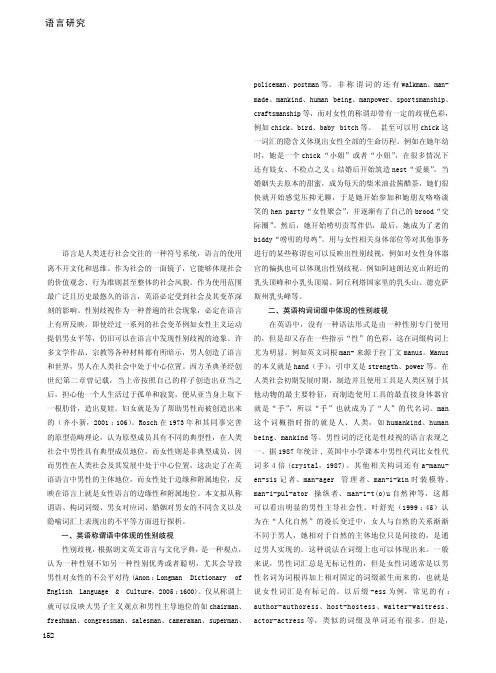
语言研究英语语言中的性别歧视探析邓畅 中国矿业大学徐海学院摘 要:语言作为一种符号系统,能够折射出社会的价值体系和文化思维方式。
性别歧视作为普遍存在的一种社会现象,也可以通过语言的使用表现出来。
本文尝试从称谓语、构词词缀、男女对应词、婚姻对男女的不同含义以及隐喻词汇上表现出的不平等方面进行探析,深入挖掘存在于西方社会中的性别歧视。
关键词:英语;性别歧视;平等作者简介:邓畅(1989-),女,汉族,江苏徐州人,研究方向:外国语言学及应用语言学。
[中图分类号]:H3 [文献标识码]:A[文章编号]:1002-2139(2016)-26-152-02语言是人类进行社会交往的一种符号系统,语言的使用离不开文化和思维。
作为社会的一面镜子,它能够体现社会的价值观念、行为准则甚至整体的社会风貌。
作为使用范围最广泛且历史最悠久的语言,英语必定受到社会及其变革深刻的影响。
性别歧视作为一种普遍的社会现象,必定在语言上有所反映。
即使经过一系列的社会变革例如女性主义运动提倡男女平等,仍旧可以在语言中发现性别歧视的迹象。
许多文学作品、宗教等各种材料都有所暗示,男人创造了语言和世界,男人在人类社会中处于中心位置。
西方圣典圣经创世纪第二章曾记载,当上帝按照自己的样子创造出亚当之后,担心他一个人生活过于孤单和寂寞,便从亚当身上取下一根肋骨,造出夏娃。
妇女就是为了帮助男性而被创造出来的(齐小新,2001:106)。
Rosch在1973年和其同事完善的原型范畴理论,认为原型成员具有不同的典型性,在人类社会中男性具有典型成员地位,而女性则是非典型成员,因而男性在人类社会及其发展中处于中心位置,这决定了在英语语言中男性的主体地位,而女性处于边缘和附属地位,反映在语言上就是女性语言的边缘性和附属地位。
本文拟从称谓语、构词词缀、男女对应词、婚姻对男女的不同含义以及隐喻词汇上表现出的不平等方面进行探析。
一、英语称谓语中体现的性别歧视性别歧视,根据朗文英文语言与文化字典,是一种观点,认为一种性别不如另一种性别优秀或者聪明,尤其会导致男性对女性的不公平对待(Anon:Longman Dictionary of English Language & Culture,2005:1600)。
- 1、下载文档前请自行甄别文档内容的完整性,平台不提供额外的编辑、内容补充、找答案等附加服务。
- 2、"仅部分预览"的文档,不可在线预览部分如存在完整性等问题,可反馈申请退款(可完整预览的文档不适用该条件!)。
- 3、如文档侵犯您的权益,请联系客服反馈,我们会尽快为您处理(人工客服工作时间:9:00-18:30)。
景德镇陶瓷学院科技艺术学院本科生毕业论文(设计)题目:Sexism in English Vocabulary学号:姓名:院(系):专业:完成时间:指导老师:CONTENTSAcknowledgements…………………………………………..Abstract in Chinese…………………………………….Abstract in English…………………………………….1.Definition………………………………………………2.Sexism in word-formation methods………………..2.1 Suffixes………………………………………… .2.2 Sexism in compound words……………………..3.Sxism in Naming and Addressing…………………..3.1 Sexism and Naming……………………………….3.1.1 Sexism in the first names………………..3.1.1.1 Derivation of Female Names from Male Names……..3.1.1.2 Sexism in Semantic Naming of First Names……….3.1.2 Sexism in the family names……………3.1.2.1 Patrilineal System of Family Names3.1.2.2 Change of Female Family Names upon marriage3.2 Sexism and Addressing……….3.2.1 Sexism in Addressing Terms…..3.2.1.1Female Social Titles upon Relationship with Mal e…3.2.1.2 Derogation of Female Honorific Titles…………….3.2.1.3 Abusive Addressing Patterns………………..4.Sexism in Proverb and Slang……………………………..4.1 Sexism in Proverb……………………………………………4.2 Sexism in Slang………………………………………5. Conclusion……………………………………………………..6. Bibliography……………………………………………………ACKNOWLEDGEMENTSMy deepest gratitude goes first and foremost to Professor Hou Xiaohua,my supervisor,for her constant and inspiring guidance and encouragement.She has walked me through all the stages of writing of the thesis.Without her constant and illuminating instruction,this thesis could not have reached its present form.Second,i would like to expree my heartfelt gratitude to all the teachers who taught me when i have striving for my Bachelor Degree for their excellent lectures and inspiring ideas.Last, my thanks would go to my beloved family for their loving considerations and great confidence in me all through these years.I also owe my sincere gratitude to my friends and my fellow classmates who gave me their help and time in listening to me and helping me work out my problems during the difficult course of the thesis摘要英语不仅是一种语言工具,也是一种意识形态工具。
性别歧视这一文化观念反映在语言的词汇学中。
牛津高级字典是这样解释的:“不平等的对待人,尤其是对女性,因为她们的性别”。
本篇论文将从英语词汇构词法、词义、称谓语及谚语和俚语分析英语词汇中的性别歧视。
所以对性别歧视了解的越多,避免的困难也就越多。
这是很有实际意义的。
关键词:语言;英语词汇;性别歧视ABSTRACTEnglish is not only a language tool, but also an ideological tool. V ocabulary of the language can faithfully reflect the culture it serves such as sexism.The oxford advanced learner's dictionary explains it as below: the unfair treatment of people, especially women, becauseof their sex.This article will discuss sexism that exists in English lexicon in terms of word formation ,word meaning ,naming and addressing terms ,as well as proverb and slang terms.So the more you know it, the better you will avoid trouble. Therefore, the present research has important practical significances.Key words:language;English word;sexism;1.DefinitionSexism,according to Oxford Advanced Learner’s English-Chinese Dictionary is defined as prejudice or discrimination against people(esp.woman)because of their sex ;and according to Longman Dictionary of Comtenporary English ,sexism is defined as ideas and believe that menbers ofone(usually man) sex are more able and clever than theode of the other sex .It is manifest in all forms of behavior from subtle gestures and especially language to exploitation and oppression,and in all human institutions from the family to the multinational corporation(Paula S.Rothenberg 1988:21).It affirms the dominance of men over women,jnst as Rosemary Radford Ruether(1993:165)holds that“sexism is gender privilege of males over females.It is males primarily who have originated this form of oppression,benefited from it,and perpetuated it,legally and ideologically.”In this sense,it keeps women in second.classstatus,denies them their rights to control their own bodies,and denies personal,mental,and physical safety;it reinforces the false notion that any man who is gentle,flexible,compassionateor gay becomes“feminine”and thereby loses status and respect.2.Sexism in word formationWord formation is one of the elements in language from which we can find many examples of sexism.The most obvious one is the word “history”,which it combines words “his”and “story”.It claimed that the history belonged to man not the woman.In general,it is divided in to two categories,adding suffixes and compounding.2.1 Adding suffixesAdding -tress is common among words like ,actress,authoress,sculptress and waitress.Although it sometimes awarded some outlanding achievements of women,the importance of its role isn’t the same as man.For instance,we usually call a man of a general manager,rather than a general manageress.The highest rank of poet in British is Poet Laureate,which it award to every distinguished poet including both males and females.Howerever,rarly had it probably honored a poet of Poetess Laureate. Word like hostess is widely accepted by people in bar ,which its meaning had been degraded.The same as in the terms of Jewess\Negrss and QuakeressThe suffix of -ette includes three meanings .The first one aims at small size,such as “cigarette(香烟)” and “kitchenette(小厨房)”.The second level is artifical ,such as“Leatherette(人造皮)”.The third level derives from the last two meanings which discloses the oweakness of woman and subordinates to man.As a result ,it discininates against woman obviously.Woman are unfairly treated.Duing the turn of 19 century and 20 century ,“Suffragette”was frequently used by women who wanted to strive rights for women.However,the public and media used it with derogation.Words like aviatrix(女飞行员),executrix(女执行官)and dominatrix(母夜叉) added the suffix of -trix,which all present an insular prejudice towards women.Women are so weak and fragile that they need obey to men.2.2 Sexism in compound wordsIn addition to sex discrimination in suffixes,compounding is a good example too.Take word-formationof common words made by “man” and “woman”for example .on one hand,there are a great many words with “man”,like human,policeman,chairman,businessman,sportsman,superman,mankind,postman,Engl ishman,airman,salesman,clergyman,kinsman,countryman,etc.Even the word “woman”is made up of “man. All these words should refer only to the male,while in fact,the meanings of these words also cover woman,which is obviously unfair to the female.Actually,this kind of words are regarded as masculine words in grammar.According to the point of view in English history,it inherits word-formation principle of Latin and old English in grammar gender.So such kinds of words empasize masculine in word structure.At the sametime,it also stresses that all things are done by the mmale, not the female in practical use.That is quite unfair to the female.On the other hand,in social life,pepole always regard women with discrimination.If a woman is engaged in noble cases,she will face much more difficulties than men.And the following meaning of words also show that the words made up of”woman”mainly emphasize the characteristics of women who are engaged in some kind of profession or belong to a certain of sector.For example,(1)Womankind: female human beings(2)Chairwoman: a woman presiding officer of an assembly meeting,committee or board(3)Womanpower:the power of woman physcial strength(4)Policewoman: a woman who is in a member of a police force(5)Womanhood:the state of being a woman;woman(6)Horsewoman:a woman horseback rider3.Sexim in Naming and AddressingSpender(1985:24) notes: one of the features of English language practices which are inherently sexist is the use of naming and addressing terms.”Naming and addressing terms play an important role in interpersonal communication.They are continuously used in our daily life hence the social and cultualfactors encoded in them are very valuable for us to explore.3.1 Sexism and NamingNaming system usually includes first name,middle name and family nam,such as “William Jefferson Clinton”.First name such as”William”in the example,is otherwise known as Chtistian name,forename or given name.Middle namelike”Jefferson”in the example occurs betwwen the first name and family name as the second forename,and is usually represented by its capitalized initial letter and is often used in formal occassions.Family name is known as Surname,or last name,which is a name shared in common to identify the mumbers of a family,which is usuallyinheritedfrom the ascending generation on the paternal side,such as’Clinton”in the example.This part will discuss the sexist phenomena in the first and family name on the basis of the analysis of their semantic features.3.1.1Sexism in the first namesGiving first name to the infant is one of the most important tasks.First name is truly a lifetime gift from parents;it helps define the children within the family,school and the outside word.Hence an analysis of sexism in first names is very significant. 3.1.1.1 Derivation of Female Names from Male NamesIn English lots of female names derivate from male names by adding affixes for example,Stephen-Stephanie,Dana-Dana.Affixs play an important role in the formation of female names.After researching affixes used to refer to female in English,Mills(1995:93)claims that those affixes lead to a view of women as a derivation from a male universal norm and the female form is seen as the marked term and the male as the unmarked term.Therefore,it is not a surprise that female names would have some consistent marker bias.Many female names derive of male ones by addingthe suffixes “-a”(or “-ia” due to phonetic reason), “e” and “-line” to them.like Albert and Alberta 、、Alex and Alexa、Daniel and Danielle、Gabriel and Gabriell and Paul and Pauline etc.First corresponding with the above, research has shown that male names differ fromfemale ones in two major aspects. Firstly, male names are shorter in spelling than female names according to the research, There are many male names are formed with one syllable such as Jim, Fred, John, Bob and Jack, while only few female names are one syllable. Furthermore, fewer female names have three or more than three syllables, such as Roberta, Victoria and Amand. Part of the explanation of this study lies in the fact that many female names are originated from male names by adding one or more syllables.Secondly, male names are phonologically different from female ones. This thesis finds that majority of male names are ended with consonant phonetic symbol in which some male names end with the stops [d], [t], [k] such as Robert, Richard, Jack; while only two femalenames do, namely, Brooke and Jade. However, most of female names analyzed endedwith a vowel [i], [i:], [ə], such as Mary and Anna, but only a few male names do so.Cutler argues (1990: 476), “Small vocal tracts such as [i], [i:], [ə], which producehigh-pitched sounds, are typically possessed by smaller, weaker, less threateningbeings.” Therefore, the frequent use of [i] in such female names as Tracey, Mary andBonnie, and [ə] in Rita, Selina and Lisa, reflects “smallness and lack of threat are heldto be desirable attributes of females”.Theoretically, the practice of deriving female names from male ones forms the contrast in which men are dominant and women are subordinate in society and meanwhile it is in accordance with the belief in Bible that woman was created from a rib of man.3.1.1.2 Sexism in Semantic Meaning of First NamesThe names that people give their children show the hopes and dreams they have for them and also reflects their parents’ hope and expectations for their children. So from their first names,we can know the different attitudes of parents to boys and girls. First names for girls and boys often reflect stereotyped features of feminity or. masculinity prevailing in a particular culture or society.It is undeniable that first names contain various connotations and this thesis will make an effort on the sexism in name’s connotat ion In our society the vast majority of first names carry clear feminine or masculine connotations. People no matter in the East or West attach great importance to marking the child’s sex when choosing a name for him or her. And in baby naming book, there might be two lists: one for girls and another for boys. According to it, parents are recommended to choose a name that identifies the child’s sex. Besides marking the sex of the child, first names for girls and boys often reflect stereotyped features of femininity and masculinity prevailing in culture. More female names contain the connotation associated with appearance while more male names contain connotation associated with wealth, power, wisdom and intelligence. It reflects the sexist expectaton that male should improve internal quality and female should pay more attention to external beauty.3.1.2 Sexism in Family NamesFamily names are passed down from generation to generation, it symbolizes the blood relationship and development of a family. From the way of giving family names, it is not difficult to find the sexism.3.1.2.1 Patrilineal System of Family NamesWhen women were born, they were given their fathers’ name and adopted their husbands’ names upon marriage. It’s only sons who carry on their fathers’ name forever, whereas women lost this capacity when they got married. This stresses the portrayal of women as the prosperity of men, passed from father to husband. They just have no freedom to own their own names. US Senator Hilary Clinton. Either way she names herself after a man-her father or her husband, or both.Children typically inherited their fathers’ rather than their mothers’ family names, which enables fathers but not mothers to achieve a direct continuity of naming from generation, provided they have sons. Even if there are only daughter, however the derivation of female forms from male names enables the transmission to continue. It’s very common for women in English-speaking countries to adapt their husbands’names upon they got married. Thus women are said to“marry into families and families are sad to ‘die out’ if an all-female” generation occurs.Thus, Spender comments:“Practically”, it means that women’s family names don’t count and there is one more device making women invisible.”In the ceremony, the, the official asks,“ Who gives the bride away?”and the father answers. “I do”, or “Her mother and I do”, but that does not solve the problem inherent in the idea that a bride is something to be handed over from one man to another.3.1.2.2 Change of Female Family Names upon MarriageWhen a woman is referred with her husband’s name, as in “Mrs. John Smith”,she is rendered both subordinate and invisible. For example, when a woman named Helen Keller marries to a man named John Fords, She is submerged by being called Mrs. John Fords. Even the woman is of high social status; it is the same with her. One of the candidates in 2008 Presidential Election of the United States of America, Hilary, the former president of Bill Clinton’s wife, kept her maiden name “Hilary Rodham” after marriage. But in order to help her husband in the election, she had to change her names. Though allegedly a feminist, she has shifted between naming herself Hilary Rodham, Hilary Rodham Clinton and Hilary Clinton.Despite the fact that some countries no longer legally require for women to adopt their husband’s names upon marriage, women who do not conform to this practice still face many practical and attitudinal obstacles.3.2 Sexism and Addressing3.2.1 Sexism in Addressing TermsAddressing term is a mark that indentifies the relationship of people in social activities, which can present our ideal and social ties. It is used frequently in the communication. According to different criteria, address forms can be divided into different classifications. They can be divided into: social titles, occupational titles, endearments, abusive terms,kinship terms etc.3.2.1.1 Female Social Titles upon Relationship with MaleMr、Miss and Mrs are used frequently when we refers to address someone in social communication. All adult men are called Mr, however women have different addressing terms after they get married. As we know, marriage and age is private. The title of Mrs indicates that women are reluctant to disclose his marriage condition, which is unfair to women.In addition to this ,when adapting the Mrs, her family names do not belong to her own ,but her husbands’."Iron Lady" Margaret Thatcher and Nobel Prize Lady Marie Curie did not change this condition. These two famous persons still surbodinated to men.人们在社会交往中称呼某个男性或女性个体时,最常使用的是Mr、Miss 和Mrs。
